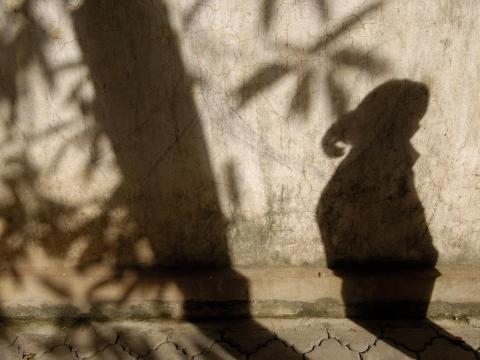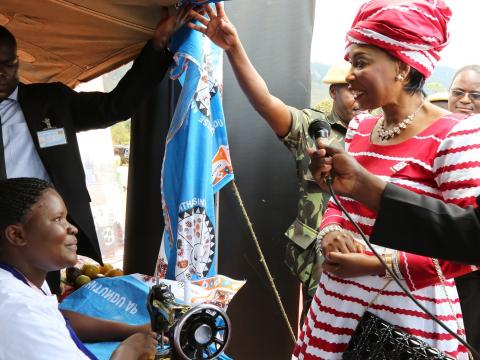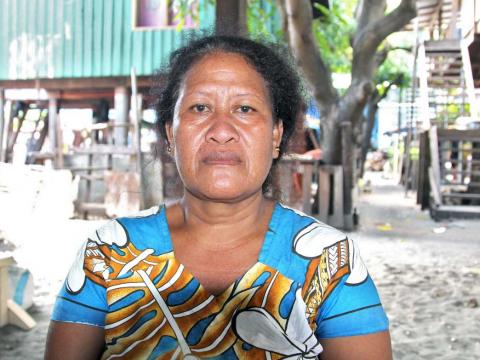
More than Moneypenny: women are leaders in security
By Frances Nobes
“Oh…you’re a woman!” For many years this was the greeting I received (verbally or in the form of wide eyes) in almost every meeting where I met people in person for the first time. While there is part of me that delights in the shock (being six feet tall also helps), it is also always a little frustrating. There are two reasons for people stating the obvious to me; firstly, I have a relatively gender neutral name, and secondly (and more compellingly), I work in security. These two facts combined (although I suspect the latter more than the former) lead to the surprised greeting. This was true in the private sector, where I started my career, and has continued to a lesser extent in the humanitarian sector.
When I say security advisor, what comes to your mind? The burly men in sunglasses, guns attached to every part of their body, a wire in their ear, perhaps running alongside a car? Or the vampire-complexioned analyst, in glasses and a suit with plenty of IT gadgets and a gut feeling that something isn’t right? Films and TV are responsible for a lot of this, but the reality is that women have been underrepresented in the security profession for centuries. Thankfully, there has been a noticeable shift in recent years. When I work with partners, attend forums and conferences it is not uncommon for half the participants to be women. We are heading in the right direction, which reflects two broad trends: the changing nature of security, and the proactive recognition and recruitment of women.
Changing security landscape
Good security isn’t about guns, guards and gates. Good security is also the ability to gain acceptance in any location through growing local relationships, as well as understanding the needs and approaches of the people you are protecting. In humanitarian security, this means gaining the trust and buy-in of staff at all levels of the organisation in order to build a functioning and effective security culture.
These softer skills are equally inherent in women and men alike, but the growing recognition of their value has meant that the demographic of the security sector has adapted to reflect this. In addition, women also bring a different experience to the security profession which can be beneficial as it allows diversity of opinion and understanding when tackling all security challenges. The lived experience of fear by women is not better or worse than that of men, but it is different; I’ve felt under threat in ways that my male colleagues have not, and I’ve responded in ways that my male colleagues may not have, and that is a valuable perspective to bring to a security role. I recommend The Gift of Fear by Gavin de Becker for a further look at our individual responses to risks, violence and security.
As security morphs in response to issues such as safeguarding, gender violence, and staff care, women are taking on increasingly security-inclusive roles. We’re finally recognising the talent that some of us might say has been here all along – time and recognition means women who worked in related roles have been promoted and moved into security roles in response to the changing requirements. I spent five years studying at university before entering the world of employment as a threat researcher. Over the past 10 years I’ve weaved my way from being a security analyst to being an advisor, moving from the realm of academia to analysis to operations. In years gone by this may never have been possible, but the combination of the changing nature and needs of security, personal determination and an empowering manager, I’ve been able to make the transition. It can take time to rise through the ranks, and years of hard work and dedication by women are beginning to show in senior leadership roles.
Encouraging women into security
To encourage more women into security, we need to work on informing them, and informing the sector.
It’s not a new idea to say women need to be actively encouraged into this sort of work – the UK government issued a report several years ago, with the slightly bizarre recommendation that UK intelligence services recruit from Mumsnet. Their well-meant and underlying point was important though. The stereotype of security as a hyper-masculine and aggressive sector needs to be dispelled, as well as the assumption that women cannot be part of the sector without previous experience in the military, police, or related field. There are many other experiences and skills which would make someone a great security manager beyond those gained in these institutions. I am a big believer that especially for younger women, “you can’t be what you can’t see”. This is partly why I step out of my comfort zone to talk publicly about this! When I was at school, I had no idea that my current job existed or could exist, which is why I jumped at the chance to record a video for my high school’s recent virtual careers fair to talk about how great it is to do my job. It’s on us as women working in security to be more visible, so young women are more likely to consider a career in the security sector.
Informing the sector is a little harder, but we’re making some good progress. Promoting the diversity of thought and experience that women can bring to the security profession is key to this, as is ensuring that the sector is able to adapt the work environment to attract and retain talented women. These considerations could include flexible working and job-sharing, and deployment and hardship posting arrangements, for example.
When people ask me what I do it’s easy to jump to seemingly exciting parts (my friends particularly enjoy the fact that I occasionally get to be an instructor on World Vision’s hostile environment training course), but I always end by saying the same thing, “this is by far the best job I’ve ever had”. Working as part of the security operations group in World Vision means we’re protecting people, whether that’s staff, people in our programmes, or children. We also help protect the organisation, by measuring risk and mitigating this as much as possible. By undertaking these two elements of protection, World Vision is able to carry out amazing life-changing and life-saving programmes all over the world. This is incredibly important work, no matter what gender you are. But as we’ve seen, women are so important to this work, and the more we can help people understand it, the less likely I am to see those raised eyebrows in a meeting.
Frances Nobes is a Security Advisor for World Vision International. Listen to Frances discuss World Vision's approach to security management on The Global Interagency Security Forum (GISF) podcast here.

